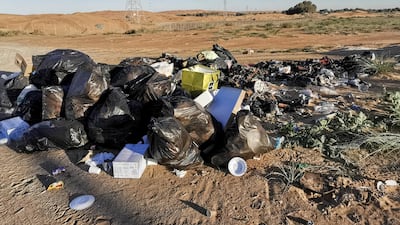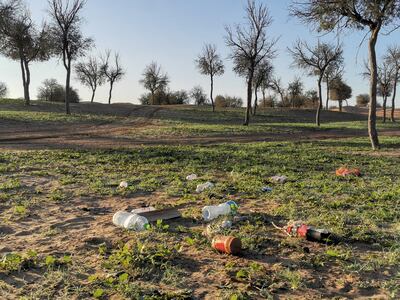Campers spending the festive holidays and New Year’s Eve in the desert have been urged to clean up after themselves or risk harming the country’s wildlife and natural environment.
Camping in the desert or mountains is a popular pastime for residents and citizens of the UAE, particularly during the cooler winter months.
Many Emiratis set up in temporary winter camps to spend their weekends with family and friends in nature.
But waste is not being disposed of properly and environmentalists say litter is threatening the country’s wildlife.
“Animals are readily lured by food waste and can be bought out of their natural habitat if attracted by food scraps,” said Savvas Othan, director of RAK animal welfare and pest control department.
“Much of the waste left by campers is made from plastics which do not break down whether it is a plastic bottle or rubbish bag, it all have impacts on the environment.”
He said the plastic litter can be ingested by animals, eventually causing them to starve, or become caught in their throats and entangled in their legs.
Mr Othan said severe enough injuries can lead to amputation.
Falah Mroish, a 40-year-old Emirati from Seih Al Harf, came across piles of rubbish while visiting Al Mazraa in Ras Al Khaimah last Saturday.
“I went there early in the morning as I heard that the area was crowded during Thursday and Friday but I didn’t expect to see that amount of garbage tossed on the ground by visitors,” he said.
Mr Mroish visits the area every weekend. He said sent pictures of the piles of rubbish to the municipality to arrange for a clean-up.
“I don't understand why people do such thing,” he said.
“It is shameful and doesn't represent our culture and good manners.”
The father of three said wild rabbits can often be seen in Al Mazraa and it is also a popular area for camels to graze.
“People should be more responsible and show care for the desert animals and the environment. Even my 10-year-old girl was shocked when she saw the photos,” Mr Mroish said.
“The area was green last week and grass grow tall due to the rain but visitors and campers damaged all the grass with their vehicles and left nothing for us to enjoy.”
The incorrect disposal of food waste can also attract flies and create a suitable environment for mosquitoes to breed, municipal officials said.
“Leaving food waste will increase the populations of flies, and other pests and waste bags left out along with food pots can accumulate rainwater which will act as a breeding site for mosquitoes,” said Mr Othan.
“Even an upturned bottle cap is enough to support mosquitoes,” he said.
Mr Othan urged the public to make environmentally conscious decisions when packing for camping trips and never leave litter behind.
“Use cardboard or paper packaging where possible instead of plastic, take a large rubbish sack with you to put all your waste in to and instead of leaving it on the side of the road, take it home with you to place in your normal garbage collection,” he said.
Anyone caught littering in Ras Al Khaimah faces a fine of Dh500, according to the emirate’s public services department.
“Raqeb inspectors (who patrol the emirate in 35 vehicles) are always available at popular camping sites in the emirate and they are ready to fine anyone who violates the environment rules,” said Aida Al Suwaidi, director of the communication Office at the department.
The department and Emirates Environmental Group organised a clean-up campaign in the area on Monday. Four-hundred and fifty volunteers collected 1.5 tonnes of litter. Of these, 15kg was recycled at local plants.
But for attitudes to shift, a harder line is needed from government, Mr Mroish said.
"There should be more inspection and awareness campaigns and the fine should be higher than Dh500 to prevent such acts in the future.”
Habiba Al Marashi, chairperson of Emirates Environmental Group, said protecting the environment was everyone's responsibility.
"While we have all seen pictures and videos of animals across the world from camels, to birds, to fish and more, succumbing to painful death because of plastic ingestion. Many don’t realise humans are also intrinsically affected by this. The waste that enter the food chain of animals often end up in humans and may affect us in the long term.
"While actions such as the Clean Up UAE are necessary to help remove these materials from our natural environment, fundamentally we hope to educate the people from littering in the first place and programmes such as these allow participants to visualise the real impact they are having on nature.
"As campers, you are coming out to nature to enjoy the outdoors and experience it’s pristine beauty. Keeping this in mind, you should respect this natural beauty for others to enjoy for generations to come as our forefathers did for us. Responsibly camping and ensuring that no waste is left behind should be the moral duty of every citizen, not only in the UAE, but our entire world."


